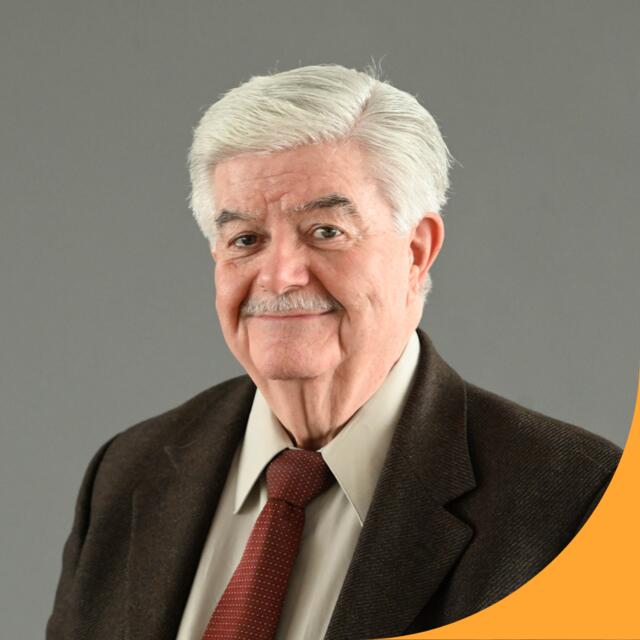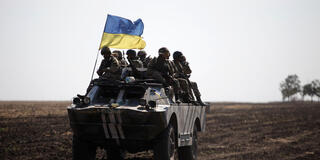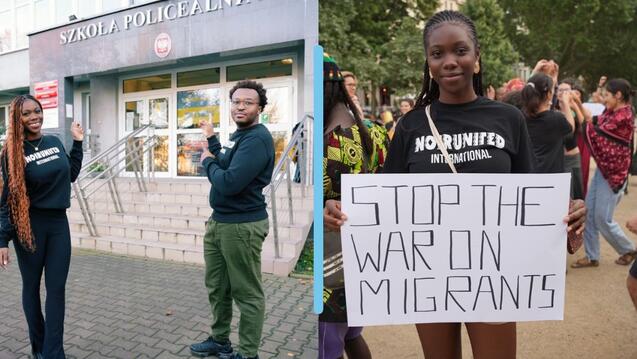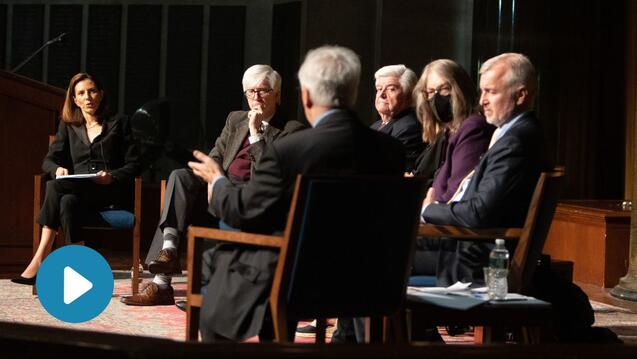
Russia and Ukraine, One Year Later

Russia and Ukraine, One Year Later
On February 24, 2022 — one year ago — Russia invaded Ukraine. To mark this somber anniversary we asked some of SIPA’s leading experts to weigh in on the ensuing war, which continues today. In their comments below, they draw on expertise in diverse areas to assess the meaning and impact of the conflict for the two nations and world beyond, offering in some cases a possible road map of what lies ahead.
-
Image

Richard K. Betts
Leo A. Shifrin Professor of War and Peace StudiesThe obstacle to peace in Ukraine at present is that neither side is willing to concede enough to induce the other side to stop fighting for more. Ukraine’s hope for progress in repelling Russian forces, to whatever degree would constitute success, depends on increasing or at least maintaining both direct western material support and international economic pressure on Moscow over the coming year while Russian military resources decline from the combination of attrition and sanctions. Whether that trend of net balance of resources between the two sides is possible—whether the West will up the ante at the same time Russia runs down—is an open question at the end of the war’s first year. If Ukraine does succeed in gaining the upper hand militarily, however, the question of whether Putin will accept defeat or try to reverse it by using nuclear weapons will become more pressing.
-
Image

Stephen Biddle
Professor of International and Public AffairsThe decisive battlefield for the war in Ukraine could end up being on Capitol Hill in Washington. U.S. funding is critical for the Ukrainian military's ability to wage the war. But that funding must be approved by U.S. lawmakers, and support for this funding among Republicans, especially in the House, is weakening rapidly.
In March 2022, a resolution in support of Ukraine passed the House and the Senate unanimously. By May, there were already 11 votes against aid for Ukraine in the Senate and 57 votes against aid in the House, all by Republicans. Among Republican voters nationally, 53 percent expressed support for assisting Ukraine in May, but by January 2023 support had fallen to just 39 percent.
There have been signs of impatience among progressive Democrats as well (in October, 30 House Democrats signed, but then quickly withdrew, a letter calling for the president to seek a ceasefire in Ukraine), but the decay in support among populist Republicans has been remarkable. More traditional Republicans such as Senate Minority Leader Mitch McConnell continue to support aid for Ukraine. But the trend in the Republican party, especially, has not been in McConnell's direction. Previous GOP leadership groups in the House have been reluctant to allow votes on legislation whose passage would require Democratic support; if a majority of House Republicans turns against the war this could be deeply problematic for Ukraine even if a majority of lawmakers overall supports assistance. And if Donald Trump wins the presidency again, or if Republicans maintain control of at least one chamber of the congress in 2024 with a larger populist caucus than today's, then it is far from clear whether the United States will continue to fund the Ukrainian war effort on anything like the scale we have seen in the last year unless McConnell and his allies prevail internally within their party.
Sound grand strategy requires an effective domestic political dimension to ensure essential funding in a democracy. If the domestic dimension of U.S. grand strategy fails, the rest may be moot. This civil war within the GOP over the interstate war in Ukraine is thus critically important for the outcome of the international struggle in Europe—and could well end up being much more important than decisions over which tanks or airplanes or surface-to-surface missiles to send to Kyiv.
-
Image

Jason Bordoff
Professor of Professional Practice in International and Public Affairs
Founding Director, Center on Global Energy Policy at Columbia SIPA
Cofounding Dean, Columbia Climate SchoolRussia’s war against Ukraine and its weaponization of energy has led to the worst energy crisis since World War II and the first truly global energy crisis. Putin’s invasion of Ukraine pulled back the curtain on decades of complacency about energy security. Governments are once again waking up to the dangers of relying on global markets for fossil fuels. Effectively dealing with energy security concerns means that we need to accelerate the clean energy transition and create policy tools that will wean the world off of fossil energy.
-
Image

Thomas Christensen
James T. Shotwell Professor of International Relations
Director, China and the World ProgramThe brutal 2022 Russian invasion of Ukraine changed world politics far from the front lines of the war and carries serious implications for China’s foreign relations, including U.S.-China relations. While I believe that China was surprised and upset by the Russian attempt to overthrow a sovereign government by military means, President Xi Jinping could not condemn Russia and thereby distance himself from his strategic partner, Vladimir Putin. After all, the two leaders had issued a long statement of Sino-Russian strategic partnership earlier that month during the Beijing Winter Olympics. Instead, Beijing’s diplomacy parroted Moscow’s propaganda, portraying a war of invasion and conquest, as merely a crisis or conflict, and blaming the United States and NATO for causing that crisis or conflict, and prolonging it through military and economic support for Ukraine. This Chinese spin alienated not only the United States but many nations in Europe, with whom China previously had much better relations.
On the other hand, Beijing has never fully allied with Moscow and, until very recently, apparently avoided giving significant material backing to Russia during the war. The United States has threatened China with significant secondary sanctions if Beijing were to offer such support to Russia while it is under multilateral U.S.-led sanctions. So, in the early months of the war Beijing walked a tightrope, on the one hand offering Moscow diplomatic support and, on the other hand, refusing Russia significant material support that could alienate China further from the United States and its allies and partners, on whom China still depends for its economic well-being. But as Putin’s war effort sputters and fails and the multilateral sanctions on Moscow weaken Russia, China appears to be falling off the tightrope on to the Russian side. What concerned me last year seems to be coming to fruition. According to public reports and U.S. government statements, Beijing appears now to be preparing to offer Russia significant material support, to include military items, to help prevent Putin’s Russia from losing the war outright.
For the Chinese Communist Party regime stability is the most important security consideration. The notion that under pressure from the United States and its allies, Vladimir Putin, President Xi Jinping’s avowed “best friend,” might lose the war outright and, potentially, lose his grip on power in Moscow is too dangerous a prospect for Xi’s Chinese Communist Party. If expected Chinese efforts to shore up Russia are followed by U.S. sanctions and Chinese retaliatory economic measures, this will accelerate economic decoupling of the two nations, heighten bilateral political tensions, and increase the danger of Sino-American war over their long-standing differences over policies toward Taiwan.
-
Image

Peter Clement
Interim Director, Saltzman Institute of War and Peace Studies
Visiting Senior Research Scholar and Adjunct Professor in International and Public AffairsThe strategic consequences of Putin’s second invasion of Ukraine extend well beyond current-day battlefield losses and ever-growing number of body bags. Putin’s miscalculation about Ukraine has significantly diminished Russia’s national security.
Some have argued that Putin invaded Ukraine to halt NATO enlargement, yet ironically, Putin’s war of choice has not only strengthened NATO cohesiveness—it has pushed Finland and Sweden into NATO’s arms, with 830 miles of Finland soon to be abutting Russian territory.
Putin’s war in Ukraine—and his oft-articulated divorce from the West-- has tightened Russia’s embrace of China; expanded political and trade ties have clearly rendered Moscow the junior partner in the relationship.
Russia’s demographic woes will be exacerbated by the 200,000 or more young men who fled last fall’s draft call and the reported 200,000 killed or wounded in the war. Russia’s current population is slightly below its 1991 population of 148 million. The loss of labor and skills in this age cohort bodes poorly for Russia’s future.
In sum, Putin’s fierce desire to secure his place in Russian history as the “gatherer of the Russian lands” will be realized—but not in ways he had imagined.
-
Image

Elise Giuliano
Senior Lecturer in Political ScienceRussia’s invasion of Ukraine has been such a strategic and political blunder for Russia that many observers who formerly deemed Putin a rational pragmatist worry that he has become irrational and reckless. If Putin is irrational and reckless, Russia’s threats to use nuclear weapons appear more credible. Is this the case? How should we think about decision-making by the Russian leaders who started the war? During the months leading up to February 24, Putin was certainly more risk-acceptant than in the past. But given the pre-existing beliefs and assumptions of Russia’s leaders at the time, the decision to go to war, while an enormous miscalculation and profoundly immoral—appears to be based on internally consistent reasoning that the west would be unlikely to mount a serious defense of Ukraine.
Russia’s foreign policy elite maintains the steadfast belief that the west has been in decline since the bipolar international system of the cold war gave way to a multipolar order marked by the rise of the BRICS: China, India, Brazil, South Africa, and Russia. Therefore, Russian leaders perceived recent developments in the United States and Europe as confirmations of western decline. For example, Russia viewed the January 6 attack on the U.S. Capitol as evidence that political polarization had weakened the United States. It saw America’s departure from Afghanistan as part of a broader retreat from its international commitments. Within Europe, Russia viewed the UK’s Brexit decision as eroding the EU, and Germany’s support for Russia’s Nord Stream II pipeline as a sign of continuing European oil and gas dependency on Russia. Perhaps most importantly, following Russia’s annexation of Crimea and war in Donbas in 2014, Russia observed only a limited western commitment to Ukraine and moderate retaliation against Russia. As a result, its leaders concluded that the west would mount a feeble response to an invasion of Ukraine and fall back into old patterns of behavior. The west’s sustained support for Ukraine and sanctioning of Russia has demonstrated that the assumptions and reasoning of Russian leaders, however internally consistent, were deeply mistaken.
-
Image

Jason Healey
Senior Research Scholar in International and Public Affairs;
Adjunct Professor of International and Public AffairsCyber experts and practitioners are still debating how important cyber operations have been to Russia and Ukraine. While it is clear that, so far, there has not been major attacks against EU and NATO countries, we are still not sure why cyber operations do not seem to have affected Ukraine. We are uncertain why, not least because of lack of visibility into cyber operations and their effects. If cyber operations have not lived up to their hype, it is not yet clear how much of that is idiosyncratic. That is, perhaps the “lessons” of cyber effectiveness only are specific to this conflict and would not hold for, say, the cyber component of a U.S.-Israeli strike against Iran.
Cyber power requires soft power. This lesson, first learned 15 years ago, has only been re-confirmed by the cyber conflict surrounding Russia’s 2022 invasion of Ukraine. Russian cyber attacks have been blunted, so far, because of Ukraine’s cyber resilience, effective cyber defense assistance from American and European tech and cybersecurity companies, and offensive and defensive cyber interventions by U.S. Cyber Command and others. This is not a new lesson: When Estonia faced on online Russian onslaught in 2007, it relied on its EU friends, its NATO allies, and its American-born (and Columbia-educated) president, Toomas, Ilves, to mitigate the Russian attack and come back stronger. Soft power—which Joe Nye defined as influencing others to get the behavior you want—is a major component of cyber power, a lesson with important implications of global security, especially in a China-Taiwan crisis.
-
Image

Kimberly Marten
Professor of Political Science, Barnard CollegeThere is unlikely to be any lasting resolution to the war anytime soon, since neither side has a strong incentive to compromise. As long as the Putin regime remains in power and demands control over sovereign Ukrainian territory, any ceasefire will be seen as unsatisfactory by both sides, with Russia wanting more than it has, and Ukraine wanting to restore its whole and free independence. A ceasefire would eventually unravel and lead to a resumption in violence. Instead this is likely to become Russia's latest version of a forever war.
If the war outlives Putin, then the question ultimately becomes how Putin's successor sees the war. Does the horror of attrition warfare come to be seen as a mistake, along the lines of how Soviet reformist leader Mikhail Gorbachev eventually saw Afghanistan, prompting Moscow's withdrawal after perhaps a decade of fighting? Or will so many Russian elites come to see this war as a truly existential conflict with the West that it defines Russia's view of the world for the foreseeable future?
-
Image

Stephen Sestanovich
Kathryn and Shelby Cullom Davis Professor for the Practice of International DiplomacyIs Putin stronger than ever, forced to listen to others when making decisions, or in danger of being ousted? No question has produced a wider range of answers since the Russian leader started his war against Ukraine a year ago. Yet the right answer may be “all of the above.”
There’s no doubt the repressive apparatus of the Russian state has become more brutally effective in the past year. Anyone can be arrested for criticizing official policy, media propaganda stokes nationalist hysteria 24/7, all major political figures keep their heads down, and senior generals are moved around at Putin’s whim.
Even so, wartime choices cannot all be made by royal edict. How to handle tensions between the uniformed military and their irregular rivals? How to set the pace of conscription? How to allocate resources as the state budget tightens this year? To make any of these decisions, Putin needs the input of people he cannot completely trust.
As for job security, holding onto power through one year of poor battlefield results may prove to have been the easy part. A second year gets harder; in a third, all bets are off. World War I provides an instructive example. When it began, nationalist enthusiasm was strong among all the belligerents. But mounting human and material costs brought tension and dissent. Putin surely knows it took only two and a half years before the Tsar was history.
-
Image

Jan Svejnar
Richard N. Gardner Professor of Economics and International Affairs
Director, Center on Global Economic GovernanceUkraine is in a dire situation, given Putin’s ruthless pursuit of imperial expansion. However, Ukraine’s heroism and capable leadership, Russia’s surprisingly inadequate military capabilities, and western support provide hope for Ukraine’s effective defense and post-war reconstruction. A dangerous development would be if China, which has so far only increased its trade in non-military products with Russia, would start supplying Russia with arms. The western world is increasingly recognizing that the battle over Ukraine is very important per se, but that it also represents a larger struggle over what will be the global rules and governance of the world.
Read Svejnar’s complete policy brief on “Russia’s Imperial War and the Need for Assistance to Ukraine During and After the War.” -
Image

Keren Yarhi-Milo
Dean, Columbia SIPA
Adlai E. Stevenson Professor of International RelationsOne of the intriguing research questions coming out of the war in Ukraine is the question of why the United States decided to reveal secret information about Russian plans to invade Ukraine to our allies, the public, and most unusually, to Putin himself—and what impact it had on both Putin’s decision to invade and the war’s trajectory.
States must weigh three core factors when deciding whether to make intelligence public. First, the cost of disclosing intelligence is that states are potentially burning sensitive sources and methods. Second, there is also the potential cost of unintentionally setting a dangerous precedent, that the state will be expected to share sensitive intelligence with allies in future conflicts in order to bring them on board. Third, states must weigh whether the intelligence revelation is significant enough to deter actions by the adversary.
My own research will continue to look at these aspects of intelligence disclosures, and the ways in which leaders decide whether or not to make them, and if so, how. This is important not just for understanding the war in Ukraine, but for illuminating similar choices in past crisis situations and decisions that could be made by policymakers going forward.


